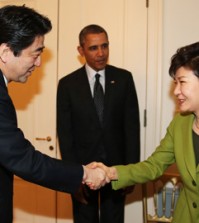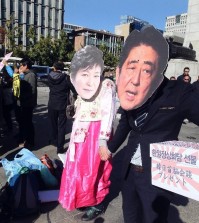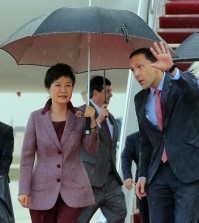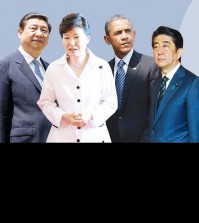- California Assembly OKs highest minimum wage in nation
- S. Korea unveils first graphic cigarette warnings
- US joins with South Korea, Japan in bid to deter North Korea
- LPGA golfer Chun In-gee finally back in action
- S. Korea won’t be top seed in final World Cup qualification round
- US men’s soccer misses 2nd straight Olympics
- US back on track in qualifying with 4-0 win over Guatemala
- High-intensity workout injuries spawn cottage industry
- CDC expands range of Zika mosquitoes into parts of Northeast
- Who knew? ‘The Walking Dead’ is helping families connect
“Park-Obama summit will be productive”
U.S. Ambassador to Korea Sung Kim interview
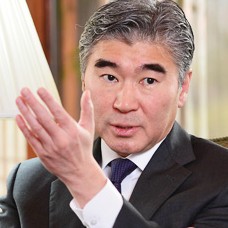
U.S. Ambassador to Korea Sung Kim speaks during an interview with The Korea Times at his residence, Habib House, in downtown Seoul. (Korea Times photo by Shim Hyun-chul)
By Chung Min-uck
US Ambassador to Korea Sung Kim said President Barack Obama’s April summit with President Park Geun-hye will be “productive” in terms of the two country’s bilateral relations.
Kim also showed a strong commitment to the Asia-Pacific region, including the Korean Peninsula, during an interview with The Korea Times, Thursday.
“The U.S. made it very clear that although there may be cuts in troops in other places, our troop presence on the Korean Peninsula will remain unchanged,” said Kim. “This is a very clear sign of our commitment to the Korean Peninsula, to Korea, but more broadly to the region.”
The following are excerpts of the interview with Kim.
Q: President Barack Obama will be visiting Korea in April. Could you please preview his summit with President Park Geun-hye?
A: The two presidents had wonderful discussions when President Park visited Washington in May of last year. I fully expect that when President Obama comes here they will have very productive summit again. They will discuss a wide range of issues, bilateral issues, regional issues, as well as global issues.
Q: Did President Obama initially plan to come to Korea? Or did his schedule change at the last minute after consultation with Korea?
A: I would not say that the White House had not finalized its decisions on the itinerary of President Obama’s visit. There wasn’t a case of Korea not included initially and added at the last minute.
Q: Most Koreans are upset about how Japanese Prime Minister Shinzo Abe has been behaving lately. And the media outlets here have formed a view that the U.S. is also not pleased with Abe’s recent behavior. How do you respond to that?
A: I think our position was made clear that we were disappointed by the prime minister’s decision to visit the Yasukuni Shrine. I think it is important to remember though that it is in the interest of the two countries, Korea and Japan, and in fact, it is in the interest of peace and stability within the whole region that these two very important countries who are very important friends of the U.S., and allies of the U.S, have constructive and positive relations. So we very much hope that the two great friends and allies will be able to focus on constructive and positive aspects of relations. Of course we recognize the pain and anger here in Korea. We understand that there are deep painful issues from the past. We always hope those issues will be addressed satisfactorily. But we do believe it is important that the two countries have constructive relations.
Q: Koreans have expectations of America. But when the U.S. is handling Japan in terms of Abe’s misbehavior, we believe Washington takes too objective a stance or shows aloofness.
A: I would dispute the notion that somehow the U.S. is being aloof. We care very deeply about this region, about relations between our two close allies. I think we have stated clearly our concerns that unfortunate developments have happened. As I mentioned when Japanese Prime Minister Shinzo Abe decided to visit the Yasukuni Shrine in December we expressed disappointment. It is not often that we express disappointment openly and publicly about a close ally. But I think it is important to distinguish, however, how we might approach the situation as opposed to us playing a mediator role. We care deeply about what’s happening in our dialogue with Korea and Japan. But we don’t think it is appropriate for us to be a mediator in the situation. We will encourage our colleagues in both countries, especially in Japan to try harder to adjust to the concerns of its neighbors. But I don’t think it would be very productive for us to be a mediator. A sense that we are being aloof comes from the fact that we are not actually acting as a mediator. But that’s not exactly our right goal here.
Q: There have been a couple of quite critical comments about North Korea by U.S. officials indicating expectations of more provocations. Are there any specific concerns behind these remarks?
A: I don’t think there has been any change in our policies towards North Korea. If you look at how North Korea has behaved, it is only prudent and responsible to anticipate and prepare for what might come out from North Korea.
Q: Can you explain what kind of condition North Korea is in after the execution of Jang Song-thaek?
A: Obviously we watch developments in North Korea very closely. We stay in very close communication with partners in the region, particularly with South Korea. You know much of our assessment of North Korea is still based on speculation. Information that we have on what’s actually happening in North Korea is limited. I think what we want to focus on is for North Korea to make the right decision and take some positive actions on nuclear issues, missiles and human rights.
Q: When will the U.S. engage in talks with North Korea and what steps must the North make for this to happen?
A: We have been very clear that we are prepared to resume negotiations with North Korea in the six-party context if North Korea can demonstrate their commitment to denuclearization. I think we are being prudent by trying to prepare for a resumption of the talks so that when the negotiations do resume we can actually make concrete progress. We have been in very close consultation with Seoul, Beijing and other partners in the region on how best we can lay the groundwork.
Q: Critics here say that the U.S. is not actively engaging with regional problems here as opposed to the Obama administration’s “Pivot to Asia” policy. What’s your take on that?
A: We have shown that we really are committed to the Asia-Pacific region. One example is, as you might have noticed, was that the Pentagon made some announcements on troop levels. They made it very clear that, although there may be cuts in other places, our troop presence on the Korean Peninsula will remain unchanged. That is a very clear sign of our commitment to the peninsula, to Korea, but more broadly to the region.
Q: Unification has become a buzzword since President Park made the “unification jackpot” remark earlier this year. Do you agree with President Park regarding her optimistic view on unification of the two Koreas?
A: I can state very categorically that the U.S. has always supported peaceful unification that reflects the aspirations of all Korean people including North Korea. We welcome President Park’s focus on reunification. I believe very strongly that a reunified Korea means more stability and prosperity. I think that should be something to be welcomed by all countries in the region.
Q: There was a report that you are retiring and that your replacement has been decided. Is this true?
A: As far as I know no such decision has been made.







